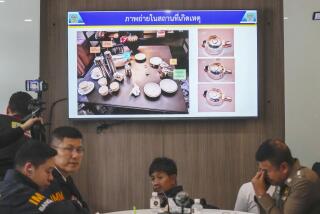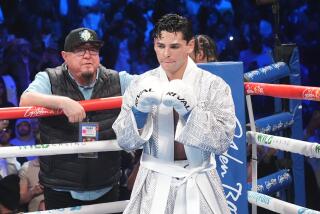Wolfowitz Unhurt in Baghdad Shelling
- Share via
BAGHDAD — At least six mortar rounds early today hit the Rashid Hotel here where Deputy Defense Secretary Paul D. Wolfowitz was staying. Several people were reported injured in the attack, but the No. 2 Pentagon official escaped unscathed.
The hotel, within a heavily fortified compound guarded by U.S. troops, is home to American military and civilian officials in Baghdad as well as some members of the U.S.-led Coalition Provisional Authority.
The mortar attack was followed by intense gunfire, said Sgt. Pedro Perez, 36, a member of the Florida National Guard, who was on duty at the checkpoint nearest the hotel. “There were 20 to 30 shots, just a few rounds came our way,” said Perez. He said his soldiers had taken cover behind sandbags.
A coalition official who was in the hotel at the time described a scene of confusion.
“There was an enormous blast followed by a series of bangs that got louder and louder. I ran to the bathroom, which is the safest place to be in the room because it’s on the inside of the building,” the official said. Leaving the hotel, the official said, “I saw blood on the floor, spots, the kind that would come from a person with a cut. People were walking around with cuts from the glass. I saw one person removed on a stretcher.”
Damage was visible on the west side of the building, which faces the Tigris River. Several balconies appeared damaged, the walls around them blackened and windows shattered. A green piece of cloth that appeared to be a curtain hung over one balcony. Witnesses described a “whooshing sound” as the mortar rounds came in.
Iraqi police said they found 11 unexploded mortar rounds in the neighborhood. It appeared that the shells that hit the hotel had been fired from a public park near the Baghdad Zoo.
Wolfowitz, who was staying on the hotel’s 12th floor, gave a media briefing shortly after the attack. Dressed in a blue blazer and shirt but no tie, he said there were “several” injuries and an unconfirmed report of one American death.
Although he appeared ashen, Wolfowitz seemed determined to project an air of confidence. As many administration officials have in recent weeks, Wolfowitz said things are improving.
“We are getting the job done despite the desperate acts of a dying regime of criminals,” Wolfowitz said, adding that those who attack Americans are “losers.” He said that though he expected the attack on his hotel to be “big news,” there was “bigger news” in Iraq, namely the progress the U.S. is making in reconstituting Iraq’s armed forces and enlisting Iraqis to fight those who have been attacking U.S. forces and their allies.
Wolfowitz was a key intellectual architect of the war against the regime of Saddam Hussein. He was on a three-day visit to Iraq, his second since President Bush declared major combat over May 1.
Wolfowitz had returned to Baghdad on Saturday after visiting U.S. troops in the northern city of Tikrit. That region, Hussein’s homeland, has seen persistent clashes between U.S. forces and resistance fighters.
Today’s attack was the second recent mortar attack on the hotel. Last month, the building was hit by a single round.
There had been concerns in Baghdad that the approach of the Muslim holy month of Ramadan would bring escalating violence to Iraq, where U.S. forces have been facing several dozen small-scale attacks each day.
On Saturday, three civilians died when their convoy was attacked near Fallouja and a U.S. military helicopter in Tikrit was destroyed in a rocket-propelled grenade attack, officials said. Wolfowitz had left Tikrit hours before the helicopter was attacked.
U.S. military officials said the attack on the civilian convoy took place about 3 p.m. along a highway northeast of the town of Habbaniyah, about 50 miles west of Baghdad near Fallouja. The convoy was hit by rocket-propelled grenades -- or RPGs -- crude bombs and small-arms fire, the officials said.
A military spokeswoman did not know the nationalities of the victims. However, a doctor at a hospital said one of those attacked was a German businessman who had been shot in the leg. His female Iraqi translator was slain, witnesses said.
Associated Press reported that the convoy consisted of three SUVs from European Landmine Solutions, a British private contractor, citing an American engineer with the firm who was hospitalized with wounds.
Asked where the shots came from, David Rasmussen, the engineer, replied: “from the USA,” Associated Press reported.
U.S. officials in Baghdad denied that troops fired at the convoy. Soldiers with the 82nd Airborne Division were nearby and responded, securing the site and rendering aid, a military spokesman said.
“According to my information, it’s impossible they were attacked by U.S. forces,” the U.S. command spokesman told Associated Press. “They weren’t close enough to either cause or prevent this attack.”
In Tikrit, a Black Hawk helicopter with the 12th Aviation Brigade, which had just landed along the Tigris River at 3:45 p.m. after completing a combat patrol, was hit by an RPG. The five soldiers evacuated safely and were rescued by the crew of a second helicopter, a spokeswoman said. One soldier was wounded.
U.S. officials have been eager to emphasize that life in Iraq is stabilizing. Coalition forces Saturday reopened a major bridge in Baghdad that had been closed since April for security reasons. In addition, coalition officials said last week that they would suspend Baghdad’s midnight-to-4 a.m. curfew during Ramadan, when Muslims have feasts late into the night.
Meanwhile in southern Iraq, an Iraqi police chief in the normally peaceful city of Amara was shot to death by unknown assailants as he left a mosque Friday afternoon. It was unclear whether the attack was directed at Abe because of his cooperation with coalition officials or for unrelated reasons.
More to Read
Sign up for Essential California
The most important California stories and recommendations in your inbox every morning.
You may occasionally receive promotional content from the Los Angeles Times.












